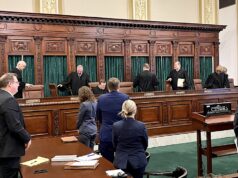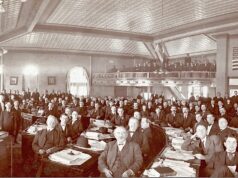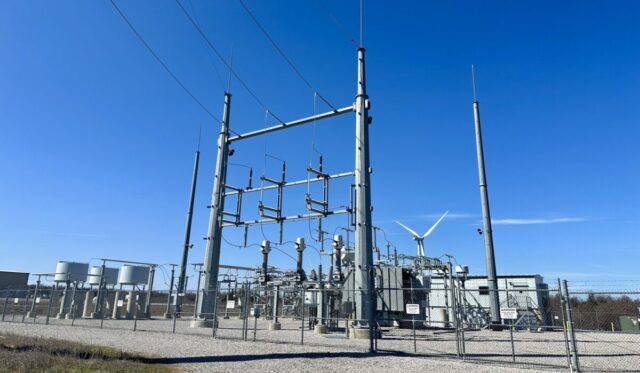

One year after two proposals dealing with so-called “right of first refusal” requirements for certain new electric transmission projects fizzled in the Oklahoma State Senate, a new version that advanced from the House of Representatives has drawn heavy lobbying from proponents and opponents in the upper chamber.
Like past ROFR-related measures, House Bill 4097 has supporters who say the measure will benefit ratepayers because utilities could save costs by increasing the number of bidders on high-voltage transmission line projects. Opponents say the opposite will occur, with passage resulting in higher rates for customers because it will increase investor-owned utilities’ monopolies.
The proposal deals with the construction and operation of 300-kilovolt electric transmission systems — the huge high-lines that carry electricity from generation to distribution points. If passed, HB 4097 would allow the state’s three investor-owned utilities — OG&E, Public Service Company of Oklahoma and Liberty Utilities, a provider of electricity to some northeast Oklahoma communities — to own and operate transmission lines that hook up to their systems in the future.
For projects in Oklahoma, HB 4097 would put the bidding and construction process along with the transmission lines’ operation under the regulation of the Oklahoma Corporation Commission instead of the Federal Energy Regulatory Commission.
Oklahoma is part of the Southwest Power Pool, a nonprofit corporation mandated by FERC to ensure reliable supplies of power, adequate transmission infrastructure and competitive wholesale electricity prices on behalf of its members. Currently, when new transmission assets are needed to connect electricity into or out of the Southwest Power Pool, the SPP seeks bids on high-voltage transmission line projects. Utilities in and outside Oklahoma bid on them and then own and operate the lines after they are built.
HB 4097 would allow the investor-owned utilities to seek bids for new transmission lines hooking up to their systems within their service territory, and the utilities would own and operate the assets after they are built. Construction of a new transmission line project would be subject to competitive bidding, but operation of the lines would not. Utilities would also have the option to bid on building a transmission line project. The bidding process would be governed by an independent OCC evaluator intended to assure the bids are competitive.
After a high-voltage transmission project would be built, the investor-owned utility in the state would purchase the system from the contractor. Proponents of HB 4097 say out-of-state firms that win a competitive bidding award are not likely to be as responsive to maintenance and repairs of the high-power transmission lines.
But opponents insist that powerful electric utilities would be gaining another avenue by which they could raise rates on the public and return profit to their investors, something they can do based on grid projects but cannot do based on fuel costs.
“It sounds, I guess, good on the surface that this will allow the utilities to seek the lowest bid, but then once they get the lowest bid, then they own and operate those utility power lines,” said Tom Schroedter, executive director and general counsel of Oklahoma Industrial Energy Consumers. His organization acts on behalf of industrial companies and other large consumers of energy, and they oppose HB 4097.
After a similar ROFR proposal failed to receive a Senate committee hearing last year, House Speaker Charles McCall (R-Atoka) decided his chamber would take the lead and push the electric utilities’ priority proposal this year. Leading the House for his final year while widely rumored as a potential 2026 gubernatorial candidate, McCall delegated ROFR negotiations to a younger GOP Caucus leader.
House Appropriations and Budget Committee Vice Chairman Trey Caldwell has spent more than a year trying to develop a new version of the legislation, which he said evolved after interim studies and countless meetings with stakeholders.
“House Bill 4097 is an accumulation of close to 300 hours of negotiations and work on a broad spectrum of utility and electrical transmission line issues that was put on my plate about 14 months ago, and in that process, many hours of discussion,” Caldwell (R-Lawton) said while presenting the bill Feb. 22 in the House Utilities Committee. “We started out somewhere north of Tulsa, and now we’ve ended up somewhere down by the Red River, speaking proverbially about how far apart from (…) where we started to where we are now.”
But Rep. Mickey Dollens (D-OKC) remains skeptical and voted against the measure both in committee and on the House floor.
“I just don’t know if this huge change is a step in the right direction, especially with a lot of the unknowns that come along with it,” he told NonDoc after the committee hearing. “Not to discredit the author’s work on the bill. I know he’s put in a lot of due diligence, but I think at the end of the day, we don’t know enough about this bill to upend the entire current process.”
‘Just another power grab by big utility companies’
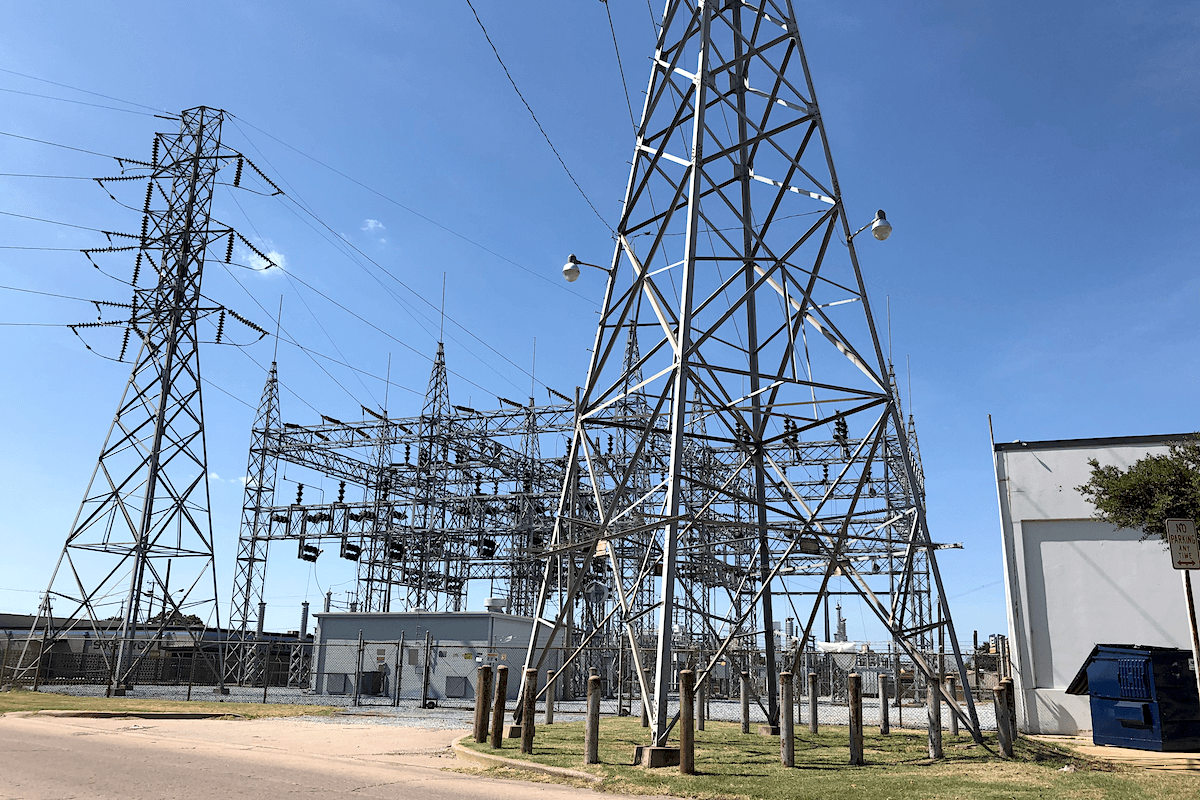
As a topic, ROFR has been bandied about at the State Capitol for the past decade. Last year, two Senate measures dealing with ROFR and investor-owned utilities failed to advance. ROFR language was removed last March from SB 1103, which secured its passage by the Senate Energy and Telecommunications Committee, but the bill never was taken up on the floor. Another ROFR measure, SB 498, failed to get a committee hearing.
Although discussed frequently at the State Capitol by lobbyists and legislators, ROFR remains a largely unfamiliar topic for many Oklahomans. As they attempt to defeat the proposal again this year, several advocacy groups and even other energy companies are trying to change that.
Sean Voskuhl, state director of AARP Oklahoma, said HB 4097 is anti-competitive and could pass additional costs to residential ratepayers, who are already struggling with recent rate increases. OG&E already has a pending rate increase before the Corporation Commission, as does PSO. Voskuhl said electric bill increases particularly affect older Oklahomans, who are also facing higher food and pharmacy prices.
“It’s just another power grab by big utility companies that will mandate an anti-competitive practice and really drive up utility rates even higher,” he said. “If you remove those incentives to keep costs down through competitive bidding, it really exacerbates the impact on residential customers’ pocketbooks.”
John Tidwell, Oklahoma state director of Americans for Prosperity, said his organization opposes HB 4097 because it would prevent new companies from competing for projects and strengthen the monopoly that existing investor-owned utilities have over electrical grids in the state. The legislation, like previous ROFR-related measures, could ultimately face legal challenges, Tidwell wrote in a recent commentary. In separate decisions over the past year, a federal appeals court and a state supreme court have blocked ROFR laws in Texas and Iowa over violations of both federal and state constitutions.
“Utility companies across the country are trying this in multiple states in the last two years,” Tidwell told NonDoc on March 14. “I think it’s an all-out push so that they can get the rules written the way that the want them, that benefit them. And I just don’t think that ratepayers want that. I don’t think they’re comfortable with that.”
According to a fiscal analysis of HB 4097, the Corporation Commission would need an additional $2.7 million to $4 million for implementation. Those cost estimates include two additional staff members to handle the program, rule-makng expenses, and the costs of consultants and expert witnesses for anticipated transmission line cases that are currently handled by federal regulators.
“For the first three years, the bill provides that the utility isn’t required to do any bidding at all,” said Schroedter, the industrial energy consumers advocate. “And then for projects that go into service three years or more, the utility is required to — if it wants to own and operate the transmission line — competitively bid the construction costs.”
He argued that such a change would inevitably raise project costs, which can be recovered by the utilities.
“What’s missing then is all of the savings that would be derived from a process of competitive bidding of the operation and ownership, such as project design, project execution, the operating costs, the financing structure, the profit margins, etcetera,” Schroedter said. “So, only one small piece is going to be competitively bid, which is the construction costs. Utilities typically, you know, competitively bid the construction costs anyway.”
Oklahoma Corporation Commissioner Kim David backs bill
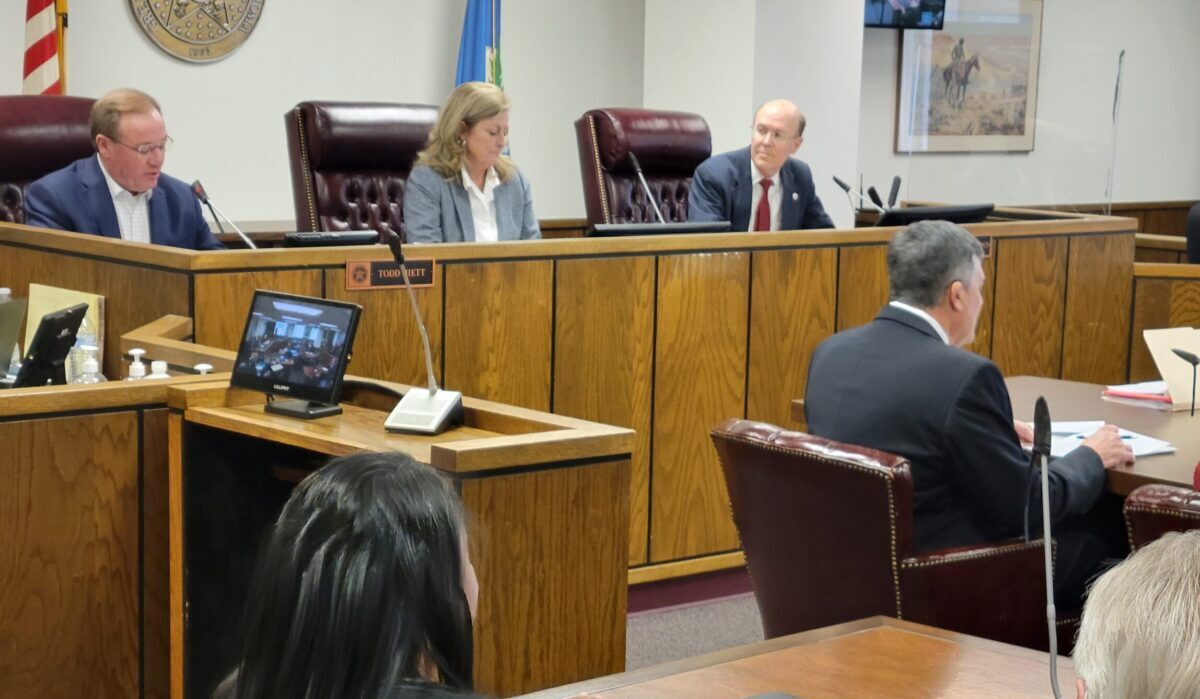
Caldwell argues otherwise, saying HB 4097 would establish first-of-its-kind policy in the nation for competitive bidding on transmission projects. He said it follows a similar generation model that already exists.
“This piece of legislation essentially pulls back control from the federal government at FERC, and it’s going to empower the Oklahoma Corporation Commission — [whose members] were duly elected by the people of Oklahoma — and allows them to make sure they can regulate (…) this type of transmission activity in the state of Oklahoma, while at the same time avoiding the downfalls of traditional ROFR practices,” Caldwell said during the February committee hearing. “What I mean by that is how we are avoiding the traditional practices of ROFR is that we are injecting competition on the front end. We’re actually going to have more competition than the current model has at SPP.”
Asked if he had talked with any of the three members of the Corporation Commission, Caldwell said Commissioner Kim David was in favor of the measure. David had planned to attend the committee meeting, but she said in a Feb. 22 letter to lawmakers that she had a scheduling conflict.
“As a commissioner, I am deeply troubled that unregulated entities can own critical infrastructure in Oklahoma while avoiding answering to the OCC or any other state body for costs or reliability,” David said. “HB 4097 addresses my concerns by untying our hands and returning crucial oversight to the state to protect ratepayers.”
The House Utilities Committee advanced HB 4097 with a 10-2 vote. The bill was approved by the full House of Representatives 65-29 on Feb. 29. Since then, Senate leaders have double assigned it to the Senate Rules Committee and the Senate Appropriations and Budget Committee.
As a result, this week could prove pivotal for HB 4097, which would need to advance from both committees ahead of an April 11 deadline.
Treat skeptical of ROFR proposal, but dynamics could change
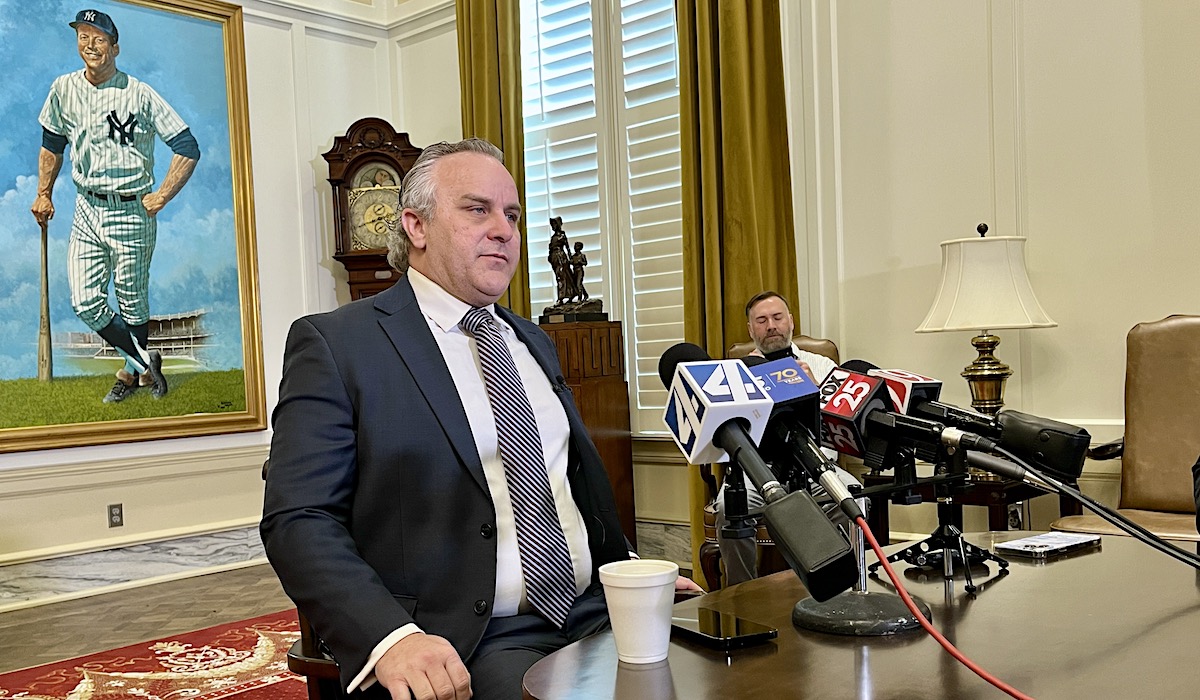
Like McCall, Senate President Pro Tempore Greg Treat (R-OKC) is in his final year of legislative service. Over his time in office, he has not been a fan of ROFR measures, but electric utility lobbyists are working hard to change his mind.
“I voted against ROFR the first time it came through in 2013,” Treat said March 19. “And you’ll notice last year when we had ROFR and [a bill on performance-based electricity rates], I dropped ROFR after the first meeting.”
Treat said he has been lobbied pretty heavily by both sides on HB 4097.
“I haven’t had a chance to read this bill yet,” he said. “I know there’s some stuff in there about anyone can bid on a project, but it has to go back to the incumbent utility. But I just have to see the details on that to make an informed decision.”
However, Treat has shown he will allow measures that he or members of his leadership team oppose to reach the Senate floor, even if he ultimately votes against them.
“I try to be responsive to the needs of the caucus,” Treat said. “I’m somebody who leads, and I try to cast a vision, but ultimately I am in my position because of the trust the caucus puts in me. And so, contrary to some members’ characterization, I really like to just have open discussion, open dialogue, and I’m not always on the prevailing side.”
As Treat said, lobbying efforts on both sides of the issue have been significant, and this week’s 2024 legislative electoral filing period has only complicated dynamics among competing interests. While lawmakers are not allowed to raise money for their campaign accounts during session, political action committee asks and famous fundraisers are well underway.
“It is politics, and OG&E is playing hardball on this one,” said one Republican senator on the condition of anonymity.
So are ROFR opponents. AARP, Americans for Prosperity and OEIC all oppose HB 4097. But proponents include OG&E, PSO and the Alliance for Secure Energy, which promotes the interests of Oklahoma’s investor-owned electric utilities and is headed by Jeff Cloud, a former OCC chairman.
As a 501(c)(6) trade organization, the Alliance for Secure Energy is allowed to engage in political activity, and it has recently sent mail pieces supporting Brian Bingman’s campaign for the Corporation Commission.
“Under [this bill]. regulated utilities must conduct competitive bidding for new transmission projects,” Cloud wrote in a recent commentary. “Local electric companies must justify their costs to own and operate critical transmission lines, ensuring customers only pay for reasonable and necessary expenses. Moreover, this legislation holds Oklahoma’s local electric companies accountable to state regulatory bodies throughout the lifespan of critical transmission infrastructure, including during extreme weather events that cause outages.”
In an interview, Cloud said the legislation also would prevent a patchwork of accountability in the electric grid by closing regulatory loopholes that could allow unregulated foreign companies to own transmission lines in Oklahoma without any responsibility to the state.
“It’s likely that it takes much longer and could cost a lot more for some out-of-state operator to hire somebody to come in and [repair damage],” Cloud said. “Whereas the local investor-owned utilities are here with their crews ready to go.”
Having the transmission lines owned and operated by local utilities would also be better for landowners who have lines crossing their land, he said.
“Who do they call on a high-voltage transmission line if there’s a problem that’s happening out there?” Cloud asked. “Since the Corporation Commission doesn’t have regulatory authority, and it’s not a local transmission company, it makes it very disjointed and unreliable and unsecure.”
Follow @NonDocMedia on:
Facebook | X | Text or Email
Utilities anticipate a ‘robust response to those requests for bids’
OIEC’s Schroedter said the industrial and commercial companies in his organization fear HB 4097 would give the electric utilities a monopoly in building wholesale transmission services, which would basically eliminate competition for new lines.
“It will lead to higher costs for customers, and it sends a message that Oklahoma is not open for competition,” he said. “If you look at the Southwest Power Pool website and look at the amount of transmission that they have planned in the future in the SPP region, there’s hundreds of millions of dollars in planned transmission expansion and improvements. And so, all the more reason to get competition. You’ll have a lot of competing developers on the sidelines (if this passes).”
Caldwell disagreed.
“Right now, the SPP has very strict standards about how do you become a bidder,” he said during the Feb. 22 House Utilities Committee hearing. “You not only have to prove that you can build it, but you have to be able to prove that you can operate it. So that automatically limits the playing field.”
Ken Miller, vice president for public and regulatory affairs for OG&E, sent a letter March 18 to all 48 senators saying HB 4097 reclaims control from the federal government through a state-administered bidding process where the Oklahoma Corporation Commission will ensure the lowest reasonable cost projects are built.
“[HB 4097] also increases accountability over critical transmission infrastructure and ensures regulated utilities will answer to the commission and customers for reliability performance instead of trusting out-of-state or foreign transmission companies that have no retail customers or regulatory oversight in Oklahoma,” wrote Miller, a former state treasurer who served before that in the House, including as chairman of its Appropriations and Budget Committee. “The integrity and reliability of critical electric infrastructure is of paramount concern for customers, especially as we face a growing reliance on electricity to power our vibrant state economy and protect it against significant threats from extreme weather and physical and cyber security concerns.”
Emily Shuart, OG&E’s director of federal, environmental and regional transmission organization affairs, said the number of bidders has gone down since the SPP started issuing competitive projects, the most recent of which was a development in the New Mexico service territory.
“There were only two bidders for that project, and the winning bid actually ended up being approximately $64 million more than the other bid, and it went into service a full year later, despite a pretty immediate need for oil and gas load in that area,” she said. “We absolutely believe that competition will increase in terms of having more bidders and really a more robust response from the market.”
Tiffini Jackson, PSO’s vice president of external affairs, said it is difficult to get bidders on transmission projects through the SPP’s current federal process because bidders are required to demonstrate an ability not only to construct the project but also to operate them in perpetuity.
“By moving that to the state, we can actually accept that they only need to demonstrate the ability to construct the facility,” Jackson said. “What we’ve seen is, in our generation side of the business, this is the process that we use, and companies sometimes get in and they will own the facilities once they’re built. We’ve recently had two RFPs where they’ve come in and built the facility, and then we’ve purchased those on completion. And we’ve seen a great response to that.
“We believe that by using that same process for the large transmission assets, we’ll see a similar robust response to those requests for bids.”
(Editor’s note: AARP and PSO are both charitable sponsors of the Sustainable Journalism Foundation.)










